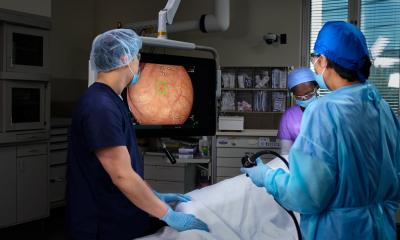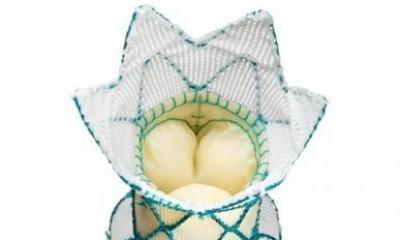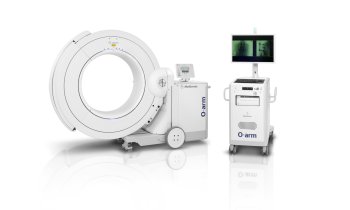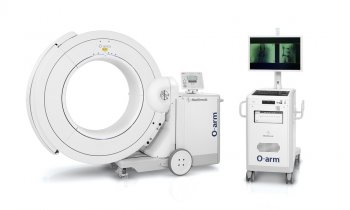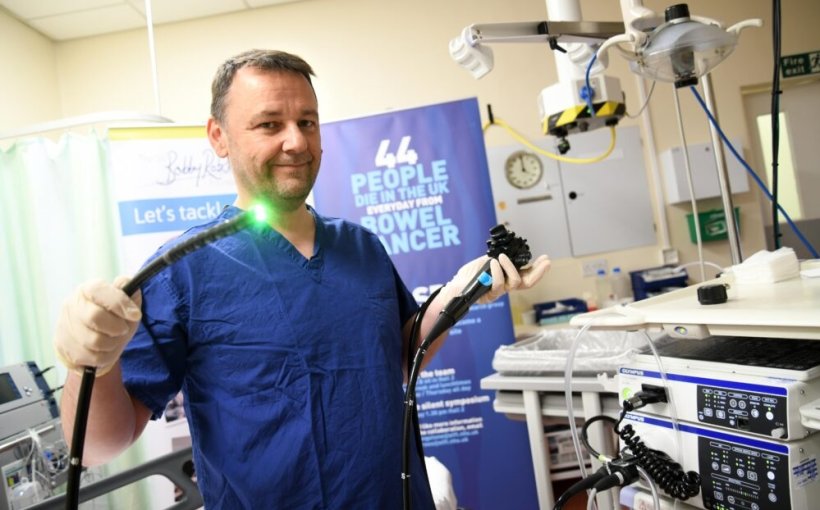
Image source: Newcastle University
News • COLO-DETECT trial
Bowel cancer: AI improves early detection
Technology using artificial intelligence (AI) to spot the early signs of bowel cancer is set for a prominent role after a research study conducted by Newcastle University showed greater efficiency in detecting potential new cases.
The findings of this research were published in Lancet Gastroenterology and Hepatology.
Newcastle University, South Tyneside and Sunderland NHS Foundation Trust led the COLO-DETECT trial involving 2,032 patients from 10 centres across England. The trial used the GI Genius AI device, a computer module powered by AI, which is added to the existing technology used during a colonoscopy. The findings showed greater effectiveness in detecting tumours that could potentially become cancerous (adenomas). As a result, the Trust will continue to make the equipment available to its teams based at Endoscopy units at South Tyneside District Hospital and Sunderland Royal Hospital.
Recommended article

Article • Diagnostic assistant systems
AI in endoscopy: helper, trainer – influencer?
Artificial intelligence (AI) is increasing its foothold in endoscopy. Although the algorithms often detect pathologies faster than humans, their use also generates new problems. PD Dr Alexander Hann from the University Hospital Würzburg points out that the use of AI helpers can affect not only the reporting of findings – but also the person making the findings.
Colin Rees, Professor of Gastroenterology at Newcastle University, who led the trial, said: “We are delighted with the outcome of this trial. Simply put, it will save lives. This trial has demonstrated that using artificial intelligence can significantly increase detection of the kinds of abnormalities in the bowel that may progress to cancer. It allows us to find these lesions, remove them, and stop them from turning into cancer. Crucially, we know that some of the polyps that lead to cancer are small polyps or flat polyps. The AI helped us find more of these lesions, it is finding the things we are concerned about as well as spotting things that we can miss with the human eye.”
The fantastic thing about AI is that it learns. It is trained by looking at images, using the data to find the differences between the images, and it is adding to its knowledge all the time, so it’s only going to get better
Colin Rees
COLO-DETECT was a randomised controlled trial, with half of the 2,032 participants in the procedure having a colonoscopy using AI, and the other half having a ‘traditional’ colonoscopy. The colonoscopy is a procedure where a camera is used to look inside the bowel, with the aim of spotting cancerous and precancerous polyps (adenomas). The trial involves putting a green box around possible polyps on the screen, which shows what the camera can see, with the clinician ultimately deciding whether to remove the polyp.
There are around 43,000 new cases of bowel cancer in the UK each year, and Professor Rees hopes this technology will now be adopted more widely to detect early signs of the disease. He added: “It is a tragedy because bowel cancer is a disease that people shouldn't be dying from. We have a long window of time when these polyps develop, probably about 10 to 15 years from developing a point to them becoming cancer. We are now using this technology routinely in our practice, and I really hope that it will be used more extensively, and the fantastic thing about AI is that it learns. It is trained by looking at images, using the data to find the differences between the images, and it is adding to its knowledge all the time, so it’s only going to get better.”
Source: Newcastle University
18.08.2024
- AI (820)
- cancer (1023)
- colon cancer (150)
- early diagnosis (218)
- endoscopy (164)
- gastrointestinal tract (139)
- studies (1087)



